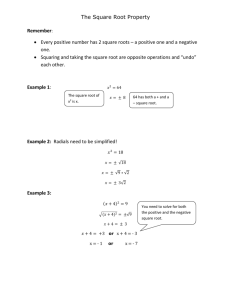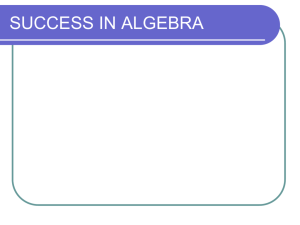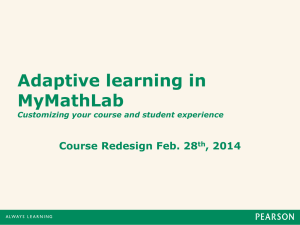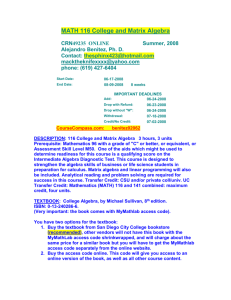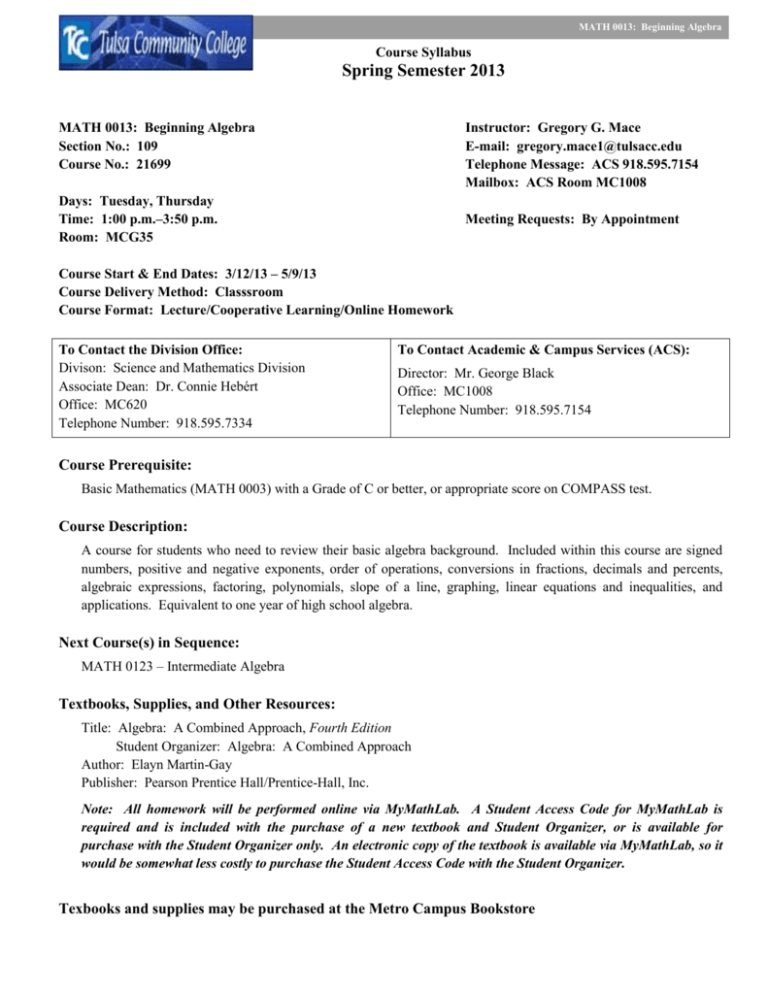
MATH 0013: Beginning Algebra
Course Syllabus
Spring Semester 2013
MATH 0013: Beginning Algebra
Section No.: 109
Course No.: 21699
Instructor: Gregory G. Mace
E-mail: gregory.mace1@tulsacc.edu
Telephone Message: ACS 918.595.7154
Mailbox: ACS Room MC1008
Days: Tuesday, Thursday
Time: 1:00 p.m.–3:50 p.m.
Room: MCG35
Meeting Requests: By Appointment
Course Start & End Dates: 3/12/13 – 5/9/13
Course Delivery Method: Classsroom
Course Format: Lecture/Cooperative Learning/Online Homework
To Contact the Division Office:
Divison: Science and Mathematics Division
Associate Dean: Dr. Connie Hebért
Office: MC620
Telephone Number: 918.595.7334
To Contact Academic & Campus Services (ACS):
Director: Mr. George Black
Office: MC1008
Telephone Number: 918.595.7154
Course Prerequisite:
Basic Mathematics (MATH 0003) with a Grade of C or better, or appropriate score on COMPASS test.
Course Description:
A course for students who need to review their basic algebra background. Included within this course are signed
numbers, positive and negative exponents, order of operations, conversions in fractions, decimals and percents,
algebraic expressions, factoring, polynomials, slope of a line, graphing, linear equations and inequalities, and
applications. Equivalent to one year of high school algebra.
Next Course(s) in Sequence:
MATH 0123 – Intermediate Algebra
Textbooks, Supplies, and Other Resources:
Title: Algebra: A Combined Approach, Fourth Edition
Student Organizer: Algebra: A Combined Approach
Author: Elayn Martin-Gay
Publisher: Pearson Prentice Hall/Prentice-Hall, Inc.
Note: All homework will be performed online via MyMathLab. A Student Access Code for MyMathLab is
required and is included with the purchase of a new textbook and Student Organizer, or is available for
purchase with the Student Organizer only. An electronic copy of the textbook is available via MyMathLab, so it
would be somewhat less costly to purchase the Student Access Code with the Student Organizer.
Texbooks and supplies may be purchased at the Metro Campus Bookstore
MATH 0013: Beginning Algebra
Course Objectives:
Upon completion of this course, students with proper prerequisites should be able to understand and apply
the following concepts:
1.
2.
3.
4.
5.
6.
7.
8.
9.
Perform the operations of addition, subtraction, multiplication and division with signed numbers.
Apply properties of real numbers and the order of operations.
Understand and use appropriate mathematical terminology.
Perform algebraic operations with real numbers.
Solve linear equations and quadratic equations (by factoring.
Solve application problems by using equations and inequalities in one variable.
Graph linear equations.
Add, subtract, multiply and divide polynomials.
Factor polynomials.
Extra Assistance
Math Lab: MC529
M-Th: 8:00 a.m.–9:00 p.m.
F: 8:00 a.m.–5:00 p.m.
The Math Lab offers excellent tutorial assistance on a one-to-one basis. In addition, the lab has computers for computerassisted instruction and drill, as well as access to the video instruction that correspond to your book. All the tutors in the
Math Lab can help with the concepts covered in Basic Mathematics. They are available during all operating hours and no
appointment is necessary.
Teaching Methods:
Class will consist of informal lecture with discussion, examples, and opportunities to practice problems and ask questions
through cooperative learning activities. Class feedback, participation, and questions are expected from all students.
While lectures and cooperative learning activities will generally reflect the concepts discussed in the text, they will not
necessarily duplicate the text, and you are responsible for reading and understanding the book. Again, do not hesitate to
ask questions! Please turn pagers and cell phones Off or on Vibrate during class; do not send text messages during
class.
Calculators:
Math is a skill that must be practiced. Moreover, this course is designed to help prepare you for MATH 1513 – College
Algebra. Accordingly, calculator usage will not be permitted either during class or on tests. While I cannot prevent
you from using them outside of class, I strongly urge you to refrain from doing so. Using a calculator at this stage of your
mathematics studies will only inhibit the development of your math skills.
Evaluation Techniques:
Your course grade will be determined based on the number of points you earn throughout the semester. Semester points
will be assessed based on the following coursework.
1. There will be three semester tests worth 100 points each.
2. There will be a final comprehensive test worth 150 points.
Created: 3/11/2013
MATH 0013/109/21699/SPRING2013
Page 2
MATH 0013: Beginning Algebra
Evaluation Techniques continued:
Note: No test score may be dropped! However, you do have the option of taking a makeup test for ONE of your first two
tests during the week of 22–26 April. For that one test, I will use whichever score is better when determining your
semester grade.
3. The semester’s online homework will be worth 100 points.
4. In-class cooperative learning activities throughout the semester will be worth 200 points.
5. Class participation throughout the semester—in addition to the cooperative learning activities—will be worth 100
points. Such participation might include well considered questions based on cooperative learning activities and/or
online homework, assistance provided to a student who might be struggling with a particular concept, etc.
Committed, regular attendance would also be an important factor in the determination of your participation points.
Course Work
Maximum Points
Semester Tests (3)
300
Final Comprehensive Test
150
Online Homework
85
Cooperative Learning Activities
110
Class Participation
55
TOTAL
700
Extra Credit: (100 Points Maximum)
1. Four pretests—one for each semester test, and one for the final comprehensive test—will be available in the
Math Lab one week before the scheduled test date. If you complete all solution steps and show your pretest
to a Math Lab assistant, she/he will help you with any problems that may have caused you difficulty, and
will then give you a copy of the solutions guide. Provided all work is clearly shown AND each pretest is turned
in the day of the actual test, a semester maximum of 60 extra credit points could be earned. No pretest will be
accepted after the actual test date.
2. Student Organizers: The Student Organizer parallels the textbook and is an excellent source of additional review
and practice. Provided the Organizer sections for each section of the course are entirely completed and turned in
the day of each semester test, a semester maximum of 40 extra credit points could be earned. No Student
Organizers will be accepted after the test date.
Test Date Policy:
All semester test dates are identified in this syllabus. Any student who knows she/he will unavoidably miss class the day
of a test is responsible for alerting me as early as possible prior to the test date. In such a circumstance, I will allow the
student to take the test before the scheduled test date. Make-up tests will not be administered after the scheduled test
date.
Created: 3/11/2013
MATH 0013/109/21699/SPRING2013
Page 3
MATH 0013: Beginning Algebra
Online Homework:
As indicated above, the combined semester homework total will be worth 100 points. All homework will be online via
MyMathLab and is due by the next class session after it has been assigned. However, homework exercises may be
submitted up to one week after they have been assigned without penalty. Each homework assignment will remain open
until 11:29 a.m. on the applicable test date, and will not be accessible thereafter. However, a daily penalty of 5%
will be assessed for each day the assignment has not been completed beyond the one-week grace period. Within the
first week the assignments remain open, students may repeat exercises as many times as necessary to ensure they receive a
100% score. After the first week and until the date of the test, students may still repeat exercises as many times as
necessary, but your score will be penalized as noted above. For example, if you correctly completed each exercise on a
particular assignment, but were two days late completing it, your maximum possible score would be 90%. If you were
three days late, your maximum possible score would be 85%. The obvious implication is that you should strive to
complete all homework assignments before the next class session, and certainly no later than one week after the
assignment date. Provided you do so, there is every opportunity for each student to receive the maximum 200 points for
the semester’s homework portion of their grade. To facilitate your own success, please do not develop a habit of waiting
until the last possible opportunity to complete your online homework assignments.
NOTE: Homework is mandatory and a passing grade in this course requires that all homework assignments be completed!
In-Class Activities:
During class you will receive worksheets or assignments to complete with the help of fellow classmates. This is
important for your success and the success of your classmates to learn Beginning Algebra. You may be asked to present
your results on the whiteboard or turn in your work at the end of the class.
Attendance:
The student is most strongly urged to avoid absences and tardiness. Poor attendance has a direct correlation with poor
course performance; this is especially so in mathematics courses. Other than for failure to attend class during the first two
weeks of the semester, the student will not be dropped from the class due to excessive absences. A request to change
from credit to audit will only be considered if a student has not been excessively absent from class. An academic
withdrawal may be considered in extenuating circumstances at the discretion of the instructor. See the Course
Withdrawal section below.
Class will not be held on the following dates:
Tuesday, 19 March, Thursday, 21 March: Spring Break
NOTE: All TCC campuses will be closed for Spring Break Monday, 18 March through Sunday, 24 March.
Course Withdrawal:
The deadline to withdraw from a course shall not exceed 3/4 the duration of any class. Check the TCC Academic
Calendar for the deadline that applies to the course(s)–for this course the final day to withdraw is Friday, 12 April
2013. Begin the process with a discussion with the faculty member assigned to the course. Contact the Advisement
Office at any TCC campus to initiate withdrawal from a course (‘W’ grade) or to change from Credit to Audit.
Withdrawal and/or change to an audit from a course after the drop/add period can alter the financial aid award for the
current and future semesters. Students may receive an outstanding bill from TCC if the recalculation leaves a balance due
to TCC. Students who stop participating in the course and fail to withdraw may receive a course grade of ‘F,’
which may have financial aid consequences for the student.
Created: 3/11/2013
MATH 0013/109/21699/SPRING2013
Page 4
MATH 0013: Beginning Algebra
Communications:
E-mail: All TCC students receive a designated “MyTCC” e-mail address (i.e., jane_doe@mail.tulsacc.edu). All
communications to you about TCC, including the possibility of communications about this course, will be sent to your
MyTCC e-mail address. You must use MyTCC e-mail to send e-mail to, and receive e-mail from, the instructor regarding
this course.
Inclement Weather:
TCC rarely closes. If extreme weather conditions or emergency situations arise, TCC always gives cancellation notices to
radio and television stations. This information is also posted on the TCC website (www.tulsacc.edu).
General Education Goals:
General Education courses at TCC ensure that our students gain skills, knowledge, and abilities that comprise a common
foundation for their higher education and a backdrop for their work and personal lives. TCC’s General Education goals
are: Critical Thinking, Effective Communication, Engaged Learning, and Technological Proficiency.
Classroom Etiquette:
Open and mutually respectful communication of varied opinions, beliefs, and perspectives during classroom or online
discussion encourages the free exchange of ideas that is essential to higher learning and to the ability to learn from each
other. Use of any electronic device is at the discretion of the instructor.
There is a good deal of material to cover in this course. Please be in class on time to prevent disrupting your fellow
students and the instructor. Please do not converse with classmates during class; again, this is disruptive to your
fellow students and the instructor. Finally, except in an emergency situation, do not leave the classroom until the
class has been dismissed.
Syllabus Changes:
Occasionally, changes to the syllabus provisions may be necessary. Students will be notified of any such changes in
writing. Changes to the Tentative Course Calendar may be made at the instructor’s discretion without written notice.
ADA Statement:
Disability Resources: It is the policy and practice of Tulsa Community College to create inclusive learning
environments. Accommodations for qualifying students in compliance with the Americans with Disabilities Act (ADA)
and Section 504 of the Rehabilitation Act are available. To request accommodations, contact the Education Access
Center (EAC) at eactulsacc.edu or call (918) 595-7115 (Voice). Deaf and hard of hearing students may text (918) 8091864.
Tobacco Free College:
Tulsa Community College is a Tobacco Free college in accordance with the Governor’s Executive Order 2012-01 and
Title 63 of the Oklahoma Statutes, Section 1-1523 which prohibits smoking or the use of any tobacco products in all
public places, in any indoor workplace, and all vehicles owned by the State of Oklahoma and all of its agencies and
instrumentalities. This Order includes property leased, rented, or owned by TCC including, but not limited to, all
grounds, buildings, facilities, and parking lots. Tulsa Community College’s policy includes a tobacco free environment
on all campus and off-campus locations conducting TCC credit or non-credit classes. The TCC Campus Police is
responsible for ensuring compliance with the Tobacco-Free Environment Policy. Violations of the policy may be
addressed through issuance of campus or state citations.
Created: 3/11/2013
MATH 0013/109/21699/SPRING2013
Page 5
MATH 0013: Beginning Algebra
Academic Dishonesty:
Academic dishonesty (cheating) is defined as the deception of others about one’s own work or about the work of another.
Academic dishonesty or misconduct is not condoned or tolerated at campuses within the Tulsa Community College
system. Tulsa Community College adopts a policy delegating certain forms of authority for disciplinary action to the
faculty. Such disciplinary action delegated to the faculty include, but are not limited to, the dismissal of disrespectful or
disorderly students from classes. In the case of academic dishonesty a faculty member may:
▪
▪
▪
▪
Require the student to redo an assignment or test, or require the student to complete a substitute assignment or
test;
Record a “zero” for the assignment or test in question;
Recommend to the student that the student withdraw from the class, or administratively withdraw the student
from the class;
Record a grade of “F” for the student at the end of the semester. Faculty may request that disciplinary action be
taken against a student at the administrative level by submitting such a request to the Dean of Student Services.
Institutional Statement:
Each student is responsible for being aware of the information contained in the TCC Catalog, TCC Student Handbook,
Student Code of Conduct Policy Handbook, and semester information listed in the class schedule. All information may be
viewed on the TCC website: www.tulsacc.edu.
“You may be whatever you resolve to be.”
Thomas J. “Stonewall” Jackson
Created: 3/11/2013
MATH 0013/109/21699/SPRING2013
Page 6
MATH 0013: Beginning Algebra
Tentative Course Calendar (continued)
Session
Day/Date
Textbook, Chapter & Section(s)
Algebra: A Combined Approach
Chapter R: Prealgebra Review
1
Tuesday
3.12.13
Section R.2: Fractions
Section R.3: Decimals and Percents
Algebra: A Combined Approach
Chapter 1: Real Numbers and
Introduction to Algebra
Section 1.3: Exponents, Order of
Operations, and Variable
Expressions
2
Thursday
3.14.13
Section 1.4: Adding Real Numbers
Section 1.5: Subtracting Real Numbers
Section 1.6: Multiplying and Dividing
Real Numbers
Assignments
Section R.2 Read & Study pp. R8–R14
MyMathLab Fractions Review Exercises
23 Exercises (23 Points)
Section R.3 Read & Study pp. R19–R24
MyMathLab Decimal Review Exercises
19 Exercises (19 Points)
Section 1.3: Read & Study pp. 20–25
MyMathLab Section 1.3 Exercises
37 Exercises (37 Points)
Section 1.4: Read & Study pp. 31–35
MyMathLab Section 1.4 Exercises
26 Exercises (27 Points)
Section 1.5: Read & Study pp. 40–44
MyMathLab Section 1.5 Exercises
32 Exercises (32 Points)
Section 1.6: Read & Study pp. 52–59
MyMathLab Section 1.6 Exercises
32 Exercises (32 Points)
Algebra: A Combined Approach
Chapter 1: Real Numbers and
Introduction to Algebra
Section 1.7: Properties of Real Numbers
Section 1.8: Simplifying Expressions
3
Tuesday
3.26.13
Chapter 2: Equations, Inequalities, and
Problem Solving
Section 2.1: The Addition Property of
Equality
Section 2.2: The Multiplication Property
of Equality
Created: 3/11/2013
Section 1.7: Read & Study pp. 65–69
MyMathLab Section 1.7 Exercises
14 Exercises (14 Points)
Section 1.8: Read & Study pp. 74–78
MyMathLab Section 1.8 Exercises
20 Exercises (20 Points)
Section 2.1: Read & Study pp. 95–99
MyMathLab Section 2.1 Exercises
18 Exercises (18 Points)
Section 2.2: Read & Study pp. 104–109
MyMathLab Section 2.2 Exercises
17 Exercises (17 Points)
MATH 0013/109/21699/SPRING2013
Page 7
MATH 0013: Beginning Algebra
Tentative Course Calendar (continued)
Session
Day/Date
Textbook, Chapter & Section(s)
Algebra: A Combined Approach
Chapter 2: Equations, Inequalities, and
Problem Solving
4
Thursday
3.28.13
Assignments
Section 2.3: Read & Study pp. 113–117
MyMathLab Section 2.3 Exercises
16 Exercises (16 Points)
Section 2.3: Further Solving Linear
Equations
Section 2.5: Formulas and Problem
Solving
Section 2.5: Read & Study pp. 140–145
MyMathLab Section 2.5 Exercises
12 Exercises (12 Points)
Section 2.7: Linear Inequalities and
Problem Solving
Section 2.7: Read & Study pp. 164–169
MyMathLab Section 2.7 Exercises
17 Exercises (24 Points)
Practice Test #1 Available in Math Lab, Room 529
5
Tuesday
4.2.13
Algebra: A Combined Approach
Chapter 3: Graphing Equations and
Inequalities
Section 3.1: Read & Study pp. 189–196
MyMathLab Section 3.1 Exercises
9 Exercises (18 Points)
Section 3.1: Reading Graphs and the
Rectangular Coordinate
System
Section 3.2: Read & Study pp. 205–209
MyMathLab Section 3.2 Exercises
12 Exercises (25 Points)
Section 3.2: Graphing Linear Equations
Section 3.3: Read & Study pp. 216–220
MyMathLab Section 3.3 Exercises
13 Exercises (22 Points)
Section 3.3: Intercepts
Test #1 Review
Test #1: Chapter R: Sections R.2 & R.3; Chapter 1: Sections 1.3–1.8;
Chapter 2: Sections 2.1–2.3, 2.5, 2.7
6
Thursday
4.4.13
Algebra: A Combined Approach
Chapter 3: Graphing Equations and
Inequalities
Section 3.4: Slope and Rate of Change
Section 3.5: Equations of Lines
Section 3.4: Read & Study pp. 226–234
MyMathLab Section 3.4 Exercises
21 Exercises (22 Points)
Section 3.5: Read & Study pp. 245–249
MyMathLab Section 3.5 Exercises
17 Exercises (21 Points)
Practice Test #2/Part 1 Available in Math Lab, Room 529
Created: 3/11/2013
MATH 0013/109/21699/SPRING2013
Page 8
MATH 0013: Beginning Algebra
Tentative Course Calendar (continued)
Session
Day/Date
Textbook, Chapter & Section(s)
Algebra: A Combined Approach
Chapter 5: Exponents and Polynomials
7
Tuesday
4.9.13
Section 5.1: Exponents
Section 5.2: Negative Exponents and
Scientific Notation
Assignments
Section 5.1: Read & Study pp. 335–342
MyMathLab Section 5.1 Exercises
17 Exercises (17 Points)
Section 5.2: Read & Study pp. 347–349
Negative Exponents
MyMathLab Section 5.2 Exercises
12 Exercises (12 Points)
Section 5.2: Read & Study pp. 349–351
Scientific Notation
MyMathLab Section 5.2 Exercises
8 Exercises (8 Points)
Algebra: A Combined Approach
Chapter 5: Exponents and Polynomials
Section 5.3: Introduction to Polynomials
8
Thursday
4.11.13
Section 5.4: Adding and Subtracting
Polynomials
Section 5.5: Multiplying Polynomials
Section 5.3: Read & Study pp. 357–362
MyMathLab Section 5.3 Exercises
13 Exercises (22 Points)
Section 5.4: Read & Study pp. 368–370
MyMathLab Section 5.4 Exercises
11 Exercises (11 Points)
Section 5.5: Read & Study pp. 375–377
MyMathLab Section 5.5 Exercises
11 Exercises (12 Points)
Algebra: A Combined Approach
Chapter 5: Exponents and Polynomials
Section 5.6: Special Products
Section 5.7: Dividing Polynomials
9
Tuesday
4.16.13
Section 5.6: Read & Study pp. 383–386
MyMathLab Section 5.6 Exercises
14 Exercises (14 Points)
Section 5.7: Read & Study pp. 392–395
MyMathLab Section 5.7 Exercises
11 Exercises (11 Points)
Practice Test #2/Part 2 Available in Math Lab, Room 529
Test #2 Review
Created: 3/11/2013
MATH 0013/109/21699/SPRING2013
Page 9
MATH 0013: Beginning Algebra
Tentative Course Calendar (continued)
Session
Day/Date
Textbook, Chapter & Section(s)
Algebra: A Combined Approach
Chapter 6: Factoring Polynomials
10
Thursday
4.18.13
Section 6.1: The Greatest Common Factor
Section 6.2: Factoring Trinomials of the
Form x2 + bx + c
Assignments
Section 6.1: Read & Study pp. 414–419
MyMathLab Section 6.1 Exercises
21 Exercises (21 Points)
Section 6.2: Read & Study pp. 424–427
MyMathLab Section 6.2 Exercises
21 Exercises (21 Points)
Test #2 Review
Test #2: Chapter 3: Sections 3.1–3.5; Chapter 5
Algebra: A Combined Approach
Chapter 6: Factoring Polynomials
11
Tuesday
4.23.13
Section 6.4: Factoring Trinomials of the
Form ax2 + bx + c by
Grouping
Section 6.5: Factoring by Special Products
Section 6.4: Read & Study pp. 438–439
MyMathLab Section 6.4 Exercises
12 Exercises (14 Points)
Section 6.5: Read & Study pp. 442–446
MyMathLab Section 6.4 Exercises
12 Exercises (14 Points)
Practice Test #3 Available in Math Lab, Room 529
12
Thursday
4.25.13
13
Tuesday
4.30.13
Test #3 Review
Test #3: Chapter 6: Sections 6.1–6.2, 6.4–6.5
Comprehensive Final Practice Test Available in Math Lab, Room 529
14
Thursday
5.2.13
Comprehensive Final Test Review
15
Thursday
5.9.13
Comprehensive Final Test
Created: 3/11/2013
MATH 0013/109/21699/SPRING2013
Page 10
MATH 0013: Beginning Algebra
Getting Started with MyMathLab
What do you need to get started?
What steps do I take next?
1) In order to register, you will need to use the Course ID appropriate to your class.
Beginning Algebra: MATH 0013-109; Course No. 21699 (Spring 2013)
Course ID – mace22892
2) Go to www.pearsonmylabandmastering.com. For an audio tour on how to register, click on ‘Take a Tour’, and
select the ‘Register and enroll in a course with a code’ tour.
3) Click on the Students ‘Register’ button.
4) Enter your six-word access code found inside your student access kit, under the pull-tab.
5) Register only ONCE using the access code in your kit. You will create your own Login Name and Password. After
registration you’ll receive a confirmation email.
6) After you've registered: Login at http://coursecompass.com (bookmark this URL), using the Login name and
Password you have just created.
7) From the “Welcome page” click on your course, then choose the “Installation Wizard” link to check that your
computer has the required set-up and plug-ins. The MathXL player must be installed for you to work exercises
within the tutorial, homework, and tests.
8) For help on entering answers, go to the audio tour: http://www.mymathlab.com/tours.html
and click on the How to Enter Answers Using the MathXL Player link.
If you have questions or need assistance call tech support at 1.800.677.6337
Created: 3/11/2013
MATH 0013/109/21699/SPRING2013
Page 11

